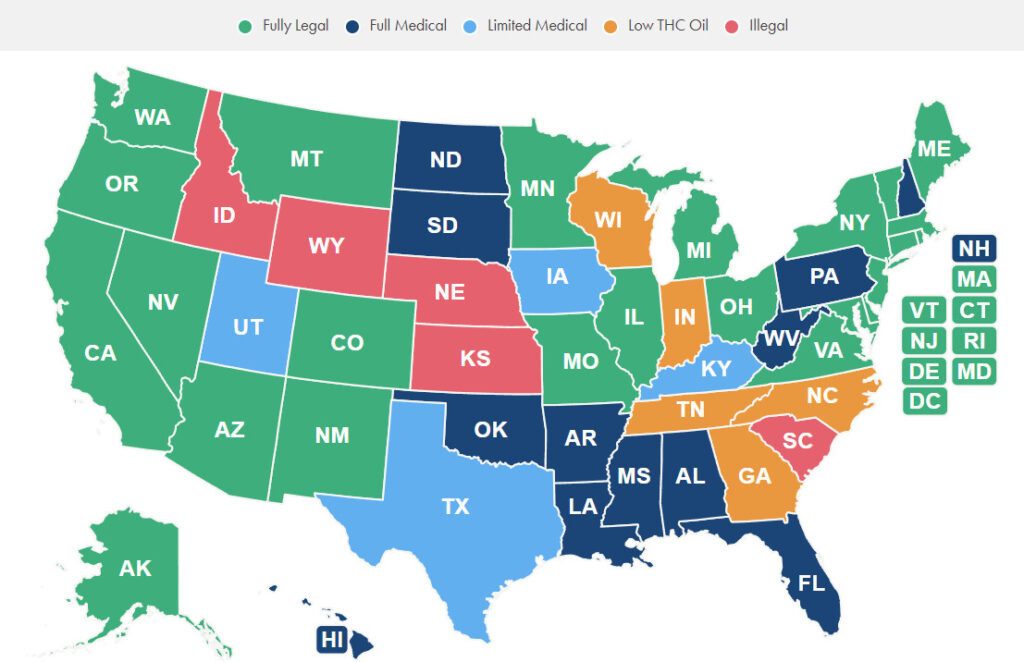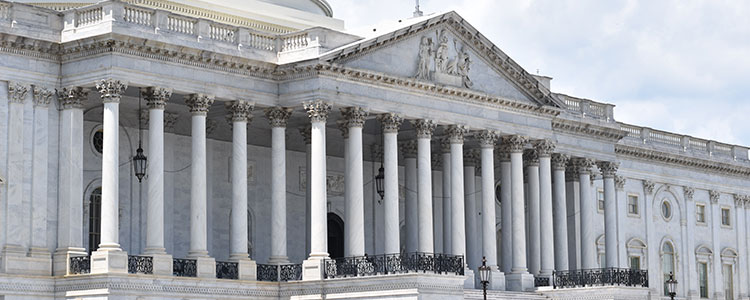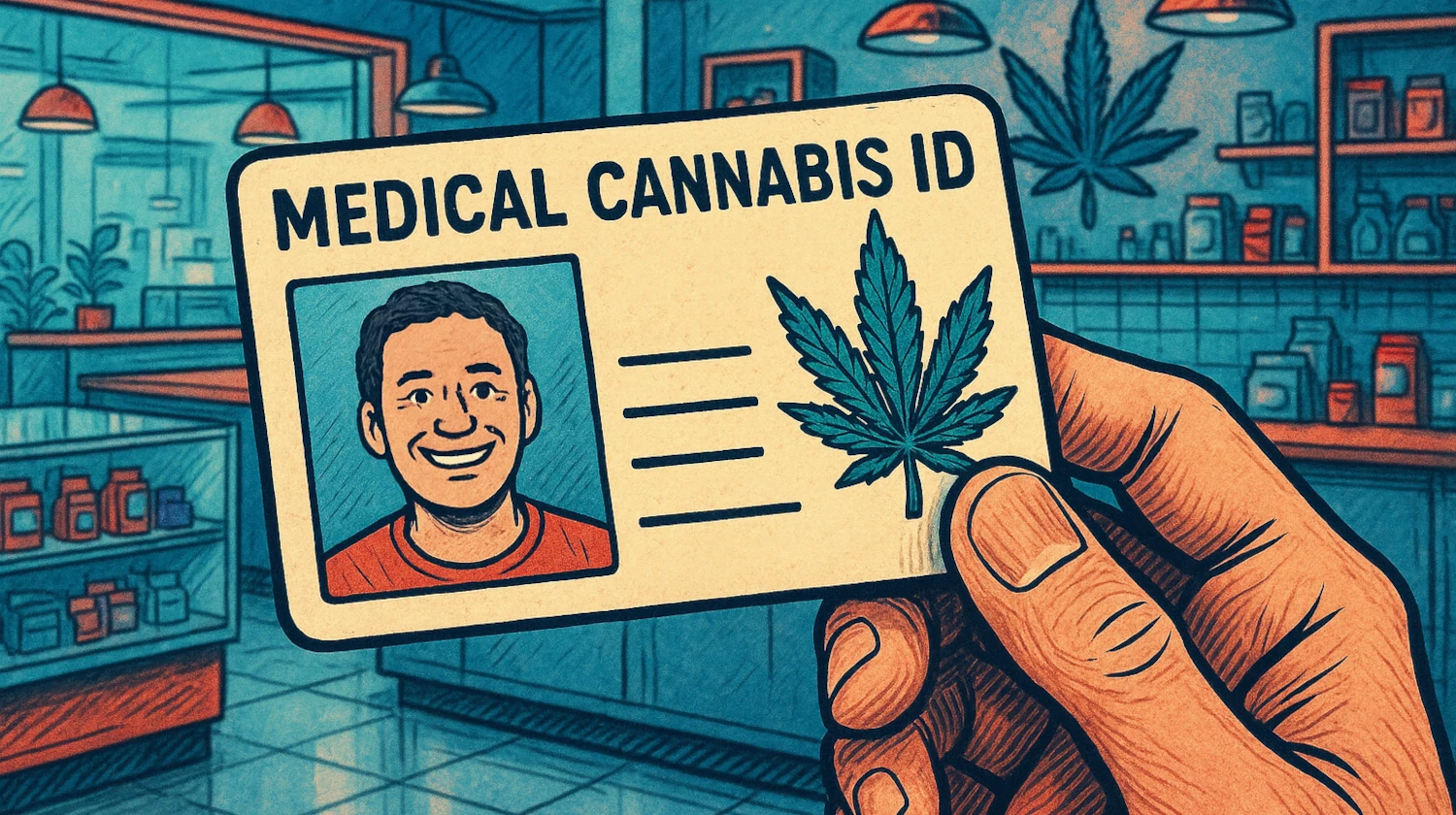In This Article
- What is a Medical Marijuana Registry?
- Who is Required to Sign Up for the Registry?
- How Do Patients Register with the State?
- What are Qualifying Conditions?
- Medical Marijuana Registry by State
- Is my data privacy safe?
- What happens when I’m included in the medical marijuana registry?
- Is the registration process different for caregivers?
- Can I own a gun if I’m on a medical cannabis registry?
- Will I be on a government list if I register?
- How long will it take to get my medical marijuana card after I register?
- Can I take my name off the registry?
- Can the federal government see that I’m a medical cannabis patient?
The legalization of medical marijuana in many states in the US has led to a number of medical marijuana programs. This allows MMJ patients to conveniently access medical cannabis while providing benefits available only to medical marijuana users.
In this article, we discuss medical marijuana registries by state: what they are, who can sign up, and how you can learn more about your state’s program.
What is a Medical Marijuana Registry?
Medical marijuana registries are a way for states with legal medical cannabis programs to keep track of patients, caregivers, and physicians who are enrolled in the program. It allows the state to monitor medical cannabis ID cards, who holds them, and when they expire.
In some states, it’s a way for dispensaries to look up registered patients. It’s also a way for law enforcement to distinguish between legal cannabis patients and people who are using cannabis illegally.
The state registry websites are also a wealth of information about the state’s program for patients, caregivers, and families. These websites will break down how to qualify for the program, who can recommend medical cannabis, and how to get started with medical cannabis. Alameda County in California has an excellent example of a medical cannabis registry from a long-running and well-established program. It’s a great resource for getting acquainted with what to look for on a state registry website.
Who is Required to Sign Up for the Registry?
In most states, patients need to register with the state’s medical cannabis registry to receive a medical cannabis ID. The registration is usually confidential, and can only be accessed by the state and possibly licensed dispensaries. In many cases, law enforcement only has access to the registry to check a patient’s registration status.
Caregivers for minor patients and patients who require assistance in purchasing and administering their medication are also required to register. Since they will be handling medication, they usually receive their own ID cards.
The state registry is optional in a few states – like California and Virginia. Still, it may offer patients access to unique benefits, like greater tax savings or a physical patient ID to supplement their digital recommendation.
Some states also have specific requirements for physicians to be able to recommend medical cannabis. In those situations, the physicians are usually required to register as well.
How Do Patients Register with the State?
Not all state registries are the same.
- Some require patients to register manually. Most often, those states have an online registration form to fill out, including uploading key documentation, like your state ID and the physician’s recommendation.
- Other states will have physicians automatically register patients after their evaluation.
Each state will also have its own requirements for registration.
- Most require patients to be over 18 years old. Patients under 18 will require a parent or guardian as a caregiver, who will also need to register.
- Most states also have a list of qualifying medical conditions. A licensed physician will need to evaluate the patient for one of those conditions and recommend medical cannabis
- Some states require state fees separate from the cost of an evaluation with a qualified medical cannabis doctor. While some states provide discounts or waivers in select circumstances, insurance typically won't cover the cost of an evaluation.
For your state’s laws and procedures and guidelines to renew your med card, check out NuggMD’s in-depth guides on state laws and regulations, or select your state below to get started.
What are Qualifying Conditions?
In most states, patients need to have been diagnosed with a serious medical condition that has been approved by the state legislative body, regulators, or medical board.
Some states have longer and more exhaustive lists, while others are much more restrictive. A few states have done away with their list of qualifying conditions, entirely, allowing physicians to use their own discretion as to whether or not medical cannabis would be an effective treatment.
While there’s no universal list of qualifying conditions, there are some that are common across most states with medical cannabis programs.
- Autism
- Cancer
- Cachexia / Wasting Syndrome
- Chronic Nausea
- Chronic or Severe Pain
- Glaucoma
- Migraines
- Multiple Sclerosis
- Post-Traumatic Stress Disorder (PTSD)
- Seizures
Medical Marijuana Registry by State

| State | MMJ Registry | Limited to Specific List of Conditions? | Age of Eligibility Without Parental Consent | Residency Required? |
| AL | (registry not active as of July 2024) Alabama Medical Cannabis Commission | Yes | 19 yrs Note: Patients under 19 can't use cannabis with more than 3% THC | Residents only |
| AK | Medical Marijuana Registry - State of Alaska | Yes | 18 yrs | Residents only |
| AR | Arkansas Department of Health | Yes | 18 yrs Note: Patients under 21 can't smoke cannabis | Out-of-state patients with an Arkansas-approved qualifying condition and MMJ card or equivalent from home state can apply for a 90-day visitor's card. |
| AZ | Arizona Department of Health Services | Yes | 18 yrs Note: Patients under 18 need a parent or guardian caregiver | Residents only. MMJ patients from other states can POSSESS but not purchase medical cannabis products in Arizona. |
| CA | Department of Cannabis Control | SB 94 and Prop 215 allow doctors to recommend cannabis for any condition the doctor feels will benefit | 18 yrs | Residents only |
| CO | Colorado Department of Public Health & Environment | Yes | 18 yrs Note: Patients under 18 need a recommendation from two independent physicians, one of whom must be the patient’s primary physician | Residents only |
| CT | Connecticut State Department of Consumer Protection | Yes | 18 yrs Note: Patients under 18 need a recommendation from two independent physicians, one of whom must be the patient’s primary physician | Residents only |
| DC | Alcoholic Beverage Regulation Administration | No for adults Yes for minors | 18 yrs Note: Patients 21 and over can self-certify without a doctor’s recommendation or qualifying condition | Any adult over the age of 21 can self-certify, and MMJ patients from other states can use their home-state card to make purchases at dispensaries. |
| DE | Delaware Health and Social Services | Yes | 18 yrs Note: Qualifying conditions and product types limited for patients under 18 | Residents only |
| FL | Florida Department of Health | Yes, but medical conditions of the same kind or class included | 18 yrs | Residents only, but seasonal residents can apply for the program |
| GA | GA Access to Medical Cannabis Commission | Yes | 18 yrs | Out-of-state patients can possess low THC oil. |
| HI | State of Hawaii Department of Health | Yes | 18 yrs | Out of state patients can apply for two 60-day cards per year |
| IA | The Office of Medical Cannabidiol | Yes | 18 yrs | Out-of-state patients may possess cannabis in accordance with Iowa rules. |
| ID | N/A | N/A | N/A | N/A |
| IL | Illinois Department of Public Health | Yes | 18 yrs Note: Patients under 21 are only allowed infused products, only allowed for seizures if under 18 | Residents only |
| IN | N/A | N/A | N/A | N/A |
| KS | N/A | N/A | N/A | N/A |
| KY | Kentucky Office of Medical Cannabis | Yes | 18 yrs | Visiting patients with a state-issued medical card may register to purchase and possess cannabis. |
| LA | Louisiana Department of Health | Yes | 18 yrs Note: Patients under 21 need a specific recommendation from their physician for smokable cannabis. Patients under 18 with autism must also have certification from a pediatric subspecialist | Act 438 permits the dispensing of medical marijuana to qualifying non-resident patients who can provide proof of a valid medical marijuana registry identification card from another state. |
| MA | Cannabis Control Commission | No | 18 yrs Note: Patients under 18 need parental consent and certification by two certifying healthcare providers, one of whom must be a pediatrician or pediatric specialist | Residents only |
| MD | Maryland Medical Cannabis Commission | Yes | 18 yrs | Residents only |
| ME | Office of Cannabis Policy | Yes | 18 yrs | Visiting patients from select states are allowed to purchase. |
| MI | Michigan Medical Marijuana Program | Yes | 18 yrs | Visiting patients from other states are allowed to purchase. |
| MN | Minnesota Department of Health | Yes | 18 yrs | Residents only |
| MO | Missouri Department of Health & Senior Services | No | 18 yrs unless emancipated | Residents only |
| MS | Mississippi State Department of Health | Yes | 18 yrs | Out-of-state patients can apply for a temporary card. |
| MT | Cannabis Control Division | Yes | 18 yrs Note: patients under 18 can't smoke | Residents only |
| NC | N/A | N/A | N/A | N/A |
| ND | North Dakota Department of Health | Yes | 19 yrs Note: minor patients are limited to products with no more than 6% THC | Residents only |
| NE | N/A | N/A | N/A | N/A |
| NH | New Hampshire Department of Health & Human Services | Yes | 18 yrs | Visitors with a state-issued medical card are allowed to make up to 3 purchases per year. |
| NJ | New Jersey Division of Medical Cannabis | Yes | 18 yrs | Visiting patients from other states are allowed to purchase. |
| NM | New Mexico Department of Health | Yes | 18 yrs | Visiting patients from other states are allowed to purchase. |
| NV | Nevada Department of Health and Human Services | Yes | 18 yrs | Visiting patients from other states are allowed to purchase. |
| NY | New York Office of Cannabis Management | No | 18 yrs | Residents only |
| OH | Medical Marijuana Control Program | Yes | 18 yrs | Residents only |
| OK | Oklahoma Medical Marijuana Authority | No | 18 yrs | Visitors with a state-issued medical card can apply for a temporary card. |
| OR | Oregon Health Authority | Yes, but a medical condition or treatment that causes severe pain included | 18 yrs | Residents only |
| PA | Pennsylvania Department of Health | Yes | 18 yrs | Residents only |
| RI | Rhode Island Department of Health | Yes | 18 yrs | Visiting patients from other states are allowed to purchase. |
| SC | N/A | N/A | N/A | N/A |
| SD | South Dakota Department of Health | Yes | 18 yrs Note: patients under 21 may not smoke | Residents only |
| TN | N/A | N/A | N/A | N/A |
| TX | (Low-THC only) Texas Department of Public Safety | Yes | 18 yrs | Residents only |
| UT | Utah Department of Health & Human Services | Yes, but pain or rare conditions not managed by conventional meds or physical interventions included | Patients under 21 must petition the Compassionate Use Board to join the program | Patients from other states with a qualifying condition in Utah may register for up to two 21-day Non-Utah Resident cards per year. |
| VA | Virginia Cannabis Control Authority | No | 18 yrs | Residents only |
| VT | Vermont Cannabis Control Board | Yes, but medical conditions that cause chronic pain included | 18 yrs | Residents only |
| WA | Washington Department of Health | Yes | 18 yrs | Residents only |
| WI | N/A | N/A | N/A | N/A |
| WV | West Virginia Office of Medical Cannabis | Yes | 18 yrs | Residents only |
| WY | N/A | N/A | N/A | N/A |

Is my data privacy safe?
Each state database is different, but they’re generally only accessible by authorized personnel within the state government. Most states have laws about when and how law enforcement can access the medical marijuana registry.
What happens when I’m included in the medical marijuana registry?
In most states, not much. The registry is just a tool the state uses to keep track of who can legally purchase and possess medical cannabis.
Is the registration process different for caregivers?
The process is usually very similar, and physicians can register caregivers at the same time as patients in some states. But every state has its own process for caregivers (and some don’t allow caregivers at all). So, it's best to check with your state’s registry for the exact details.
Can I own a gun if I’m on a medical cannabis registry?
No. Since the federal government still considers cannabis an illegal drug, even for medical purposes, it is illegal for medical cannabis patients to own a firearm. In some very rare cases, legislation may attempt to override federal law on this point. For instance, in Texas, the program specifically states that being an MMJ patient does not necessarily disqualify a resident from owning firearms. In Missouri, Amendment 3 would codify medical marijuana patients' Second Amendment rights if it passes. Check with a qualified attorney in your state to learn more.
Will I be on a government list if I register?
Since the registration is a government list, yes, but access to the list is limited, as in many states, a medical cannabis card is considered protected health information. Many states have laws preventing any kind of persecution based on registration status, and the registry can’t be used by law enforcement except to look up registration status in most states.
How long will it take to get my medical marijuana card after I register?
That varies from state to state. Some states issue temporary forms of ID for use until the permanent card arrives (typically within 2-3 weeks of registering). Others don’t provide physical ID cards at all, allowing patients to purchase cannabis the day they're approved. In some states, patients must wait for the state to process their application and mail their physical card, which can take 30 days or longer.
Can I take my name off the registry?
Most states allow patients to leave the medical cannabis program and have their names removed from the registry whenever they choose. That said, registration only lasts for a year at a time in most states, and you’ll be removed from the registry if your card expires.
Can the federal government see that I’m a medical cannabis patient?
In recent years, the federal government hasn’t interfered with state medical cannabis programs. That doesn’t mean it’s impossible, but these registries are internal state databases for use within the state, and granting the federal government access would probably require a court order of some sort.
The information in this article and any included images or charts are for educational purposes only. This information is neither a substitute for, nor does it replace, professional legal advice or medical advice, diagnosis, or treatment. If you have any concerns or questions about laws, regulations, or your health, you should always consult with an attorney, physician or other licensed professional.




